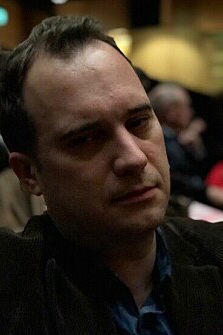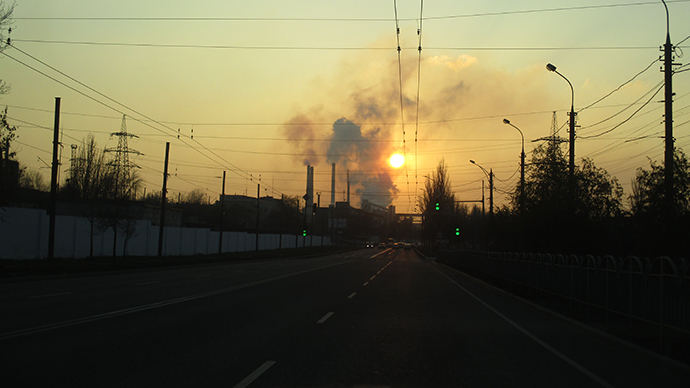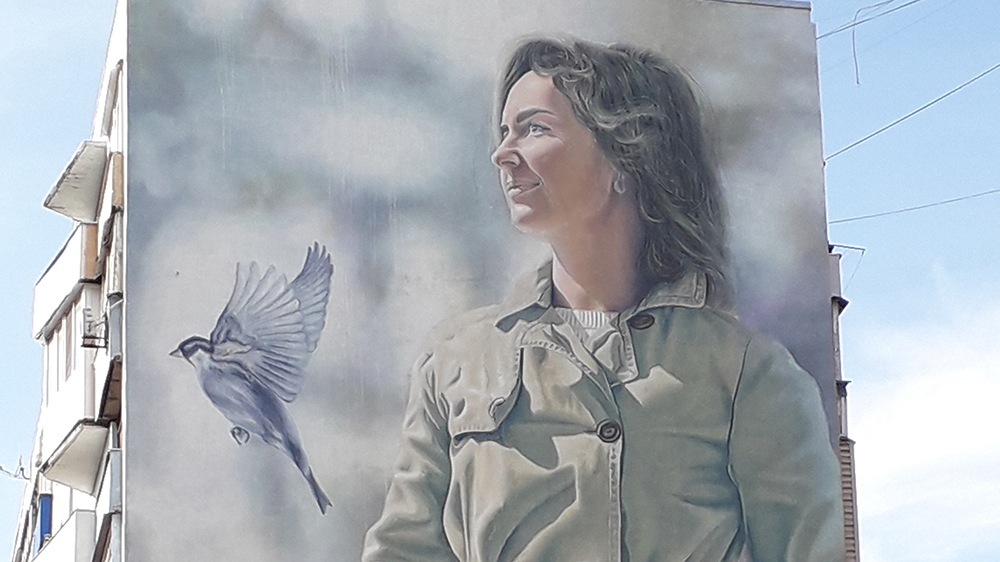Michael Gentile, a Professor at the Department of Sociology and Human Geography (ISS), has been carrying out research on Ukraine for several years, particularly in the east of the country.

His last visit to the port town of Mariupol was in January. Michael Gentile has participated on a major research project in close collaboration with Ukrainian researchers to study, for example, how fake news affects daily lives in Ukraine.
“There is such a wide spectrum of disinformation in Ukraine. One example is the widespread belief in Mariupol that it was Ukrainians who fired at a residential area in the city on 24 January 2015. “In reality, it was either Russian forces or forces from the Donetsk republic, both pretty much the same party. Many people died and many more were injured,” he says.
Today, he is no longer sure what the people of Mariupol think, now that the city is surrounded by Russian forces.
“It worries me to think how widespread that conspiracy theory from 2015 was. What impact does this have on how people perceive current events? Do the locals actually believe that the Russians are now protecting Mariupol? I'm not sure.”
Claims of cultural genocide
The research collaboration with Ukrainian colleagues has now been put on hold. His colleagues have gone into hiding or are fighting for their country. Michael Gentile recently drove to the Slovakian border to pick up the family of one of his colleagues.
“When I realised where things were going, I offered to help in the event of an invasion. And then there came a cry for help.”
When he arrived at the border, many of the sights he saw left a lasting impression. One positive was how well organised things were for the refugees in Slovakia.
“They received pizza, fruit and sandwiches. There was plenty of people there to help. It made me happy to see how quickly this service had been set up, in the poorest part of Slovakia.”
As so many others, Michael Gentile never believed that Russia would actually embark on such a large-scale attack. He refers to an article by President Vladimir Putin, published on the Kremlin website (no longer fully available due to hacking), in which the President writes that Ukrainians are not people, but Russians. He also claims that Ukraine is carrying out a cultural genocide of Russians.
In more recent speeches, Putin has also claimed that Ukraine is guilty of actual genocide of the Pro-Russian citizens in Ukraine.

A declaration of war
“When you read the article, you realise that it’s as close as you can get to a declaration of war. So, in that way, it was perhaps to be expected. But nobody really dared to think that it could happen, including me. At the same time, I wasn’t sure,” he says.
He believes that the claims of cultural genocide are not based on reality.
“Ukraine implemented a relatively stringent act governing language in 2021, determining that the Russian language was reserved for private use. In my opinion, this was a mistake. Nonetheless, it’s absurd to call the act cultural genocide and, what’s more, it’s an insult to the genuine victims of genocide,” says Michael Gentile.
«I believe that this war will affect the relationship between Russians and Ukrainians for at least two generations»
- Michael Gentile
The Professor goes on to explain that Eastern Ukrainians are strongly prejudiced against Western Ukrainians, predominantly supported by Pro-Russian propaganda. At the same time, the people in the west are strongly prejudiced against Eastern Ukrainians.
“But these prejudices don’t really involve the language people speak. Some people in the west think that the people in the east have a slightly old-fashioned Soviet mindset, while the people in the east tend to think of the people in the west as nationalists and call them fascists,” he explains.
He goes on to say that nationalism in Ukraine is by no means a dominant force.
“Votes for the extreme right in Ukraine are much lower than in many other countries. So, to claim that Ukraine is a Nazi nation is absurd. Neither do I believe that the people who speak Russian are suppressed. But the act governing language in the country is harsh.”
A history of conspiracy theories
The fact that in 2015 and afterwards, there was such a strong belief in Mariupol that Ukrainians were behind the attack on the city is based on Pro-Russian disinformation, according to Michael Gentile.
“Local agents spread disinformation, with the support of the Russian state media.
This type of information is particularly widespread and popular in East Ukraine,” he says.
He goes on to point out that East Ukraine has a long history of disinformation and conspiracy theories, also witnessed in relation to COVID-19, which has been described as a disease invented by an American laboratory.
“These are the same as the conspiracy theories spread by the KGB in the Soviet Union during the last half of the 20th century, and particularly in the 1980s in connection with the HIV/AIDS epidemic. But this time, they come in a new context.”
The Belarusian election
Michael Gentile refers back to how Vladimir Putin, after the election in Belarus in August 2020, decided to support President Alexandr Lukashenko. This led to Russian journalists taking over the media in Belarus, implementing a massive campaign of propaganda. The Professor claims that this also had an impact in Ukraine.
“We carried out studies in Mariupol, both before and after the election in Belarus, to assess the level of belief in a number of conspiracy theories. Support for these theories increased after the election,” explains Michael Gentile.
One example of these theories is when the Russian state media and Pro-Russian Ukrainian media claimed that the West, represented by businessmen Bill Gates and George Soros, actually govern Ukraine. Prior to the election in Belarus, around 30 percent of the citizens in Mariupol said that they did not believe this. After the aggressive information campaign for the election, this number fell to six to seven percent, according to Michael Gentile’s data.
He questions what this propensity to believe Russian-fabricated conspiracy theories means for resistance today.
“The truth is, I don’t know. Believing in a Pro-Russian conspiracy theory does not necessarily mean that they will welcome the Russians with open arms. And when the Russian soldiers start shooting at them, this is even more unlikely,” says Michael Gentile.
At the same time, he adds, the example from 2015 shows that conspiracy theories can gain a foothold in extreme situations.
Will never gain political control
Michael Gentile has no knowledge of what is happening in Mariupol right now. Based on his project data, however, there is a group of clearly Pro-Ukrainian citizens that makes up around 15-20 percent of the city’s citizens. At the same time, there is an even larger group of Pro-Russian citizens who want Ukraine’s foreign policy to lean more towards Russia.
“And then there’s a huge group of people in the middle, who can be influenced. My belief is that Russia, by going to war, has influenced this group in the middle to turn against supporting Russia,” he says.
He adds that, in a war, everything can change very rapidly.
“I personally believe that a soft, cautious and gradual Russian take-over of power could perhaps have been successful in parts of Ukraine. But what they are doing now will not succeed. Russia may be able to gain military control over most of the areas in the east, but they will never achieve political control over the country as a whole. Once you start shooting, you’re no longer a friend.”
Will impact generations
If Russia manages to occupy Ukraine, Michael Gentile believes that there will be a small clique of persons with strongly Pro-Russian opinions who will join the occupying forces.
“But the rest of the people will make it very difficult for Russia to control the country, particularly in the major cities such as Kharkiv and Kyiv,” he says.
He is keen to point out that this is his own personal view. This is partly based on his own research, but also on the experience he has gained via regular contact with the country over a number of years.
“Many Ukrainians have thought of the Russians as their friends. I believe that this war will affect the relationship between Russians and Ukrainians for at least two generations,” he says.
He adds: “What could possibly prevent this is if the Russian people rise up against Putin.
The oppressive regime in Russia is brutal, but there is a limit to how far an autocracy can go.”
Read Michael Gentile and Martin Kragh's article "The 2020 Belarusian presidential election and conspiracy theories in the Russo-Ukrainian conflict" in the journal International Affairs.
